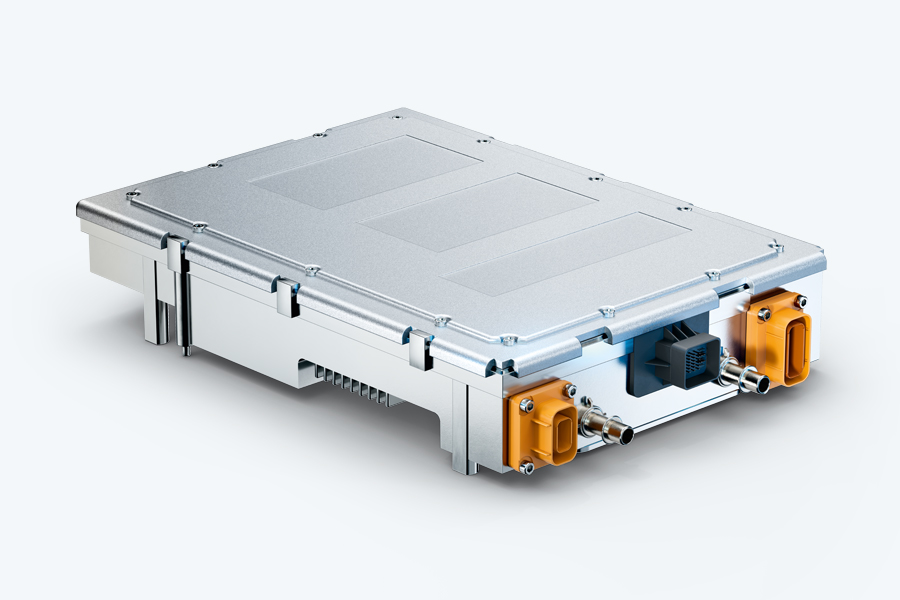Various technologies are currently used to charge electric vehicles. Wall boxes are used for private charging, while public charging is done mainly using cable-based charging stations incorporating DC (direct current) and AC (alternating current) technology operating at a wide range of power outputs. Wireless charging systems that utilise inductive technology are already in use – mainly, for now, in fork lifts, warehouse trucks and last-mile vehicles, although they would seem to have enormous potential, for buses and especially for taxi ranks.
Aside from the charging process itself, an on-board-charger (OBC) in the vehicle authenticates the vehicle at the charging station, transforms alternating current into direct current, manages communication between the vehicle and the charging station, and manages the battery.
Wevo has developed customised potting compounds and adhesives based on polyurethane, epoxy resin and silicone for the various components and needs of charging systems. These solutions help to make operation safe for long periods of time, even if ambient conditions change a lot and temperatures are high.
SAFE CHARGING WITH WEVO PRODUCTS
Because they are used outside, sensitive components are subject to changing and often challenging ambient conditions. Wevo materials provide electrical insulation and prevent moisture from getting in. For instance, a water-repellent and flame-retardant potting compound has been developed with UL certification in order to protect charging plugs; it insulates the plug, which, among other things, protects users against electric shocks.
Thermal management also plays an important role, especially in fast charging stations that can have power outputs of up to 360 kW. Thermally conductive potting compounds and thermal interface materials based on polyurethane, epoxy resin and silicone help to channel heat quickly and safely away from transformers, capacitors and batteries to heat sinks and the surrounding environment.
OBCs also contain power electronic components as well as transformers, chokes and capacitors, and these are getting hotter and hotter as they become smaller and more compact. Wevo has also developed special, thermally conductive potting compounds and gap fillers for these applications, which channel heat away quickly and can withstand temperatures of up to 160 °C.
POTTING COMPOUNDS AND ADHESIVES FOR INDUCTIVE CHARGING SYSTEMS
Another area in which Wevo products are used for charging infrastructure is wireless inductive charging systems. They consist of a receiver module on the vehicle and a transmitter plate, which is usually embedded in the road itself or in a parking space.
Wevo has developed a number of materials to protect sensitive components in transmitter plates. These include silicones and modified polyurethanes based on polybutadiene diols, which are especially hydrophobic and water-repellent due to their polybutadiene backbone. A low glass transition temperature of around –60 °C makes these materials very suitable for outdoor use.
Numerous ferrite cores are built into the transmitter plate; these, combined with the copper winding, are what produce the induction field. Ferrites are very brittle by nature and prone to cracks and chips. Wevo’s potting compounds, with their optimised elasticity, surround the ferrite cores and act as a buffer, damping vibrations and shocks and preventing cracks and breakages.
The fillers used also channel heat away well and provide fire protection. The potting materials have good dielectric properties, which ensures an undisturbed signal transmission between transmitter and receiver. In addition, Wevo has also developed rigid epoxy resins and polyurethanes for the transmitter plate’s top layer or cover. This means the transmitter plate can withstand the forces and mechanical vibrations caused by vehicles driving over them.
PROTECTION FOR ELECTRICITY METERS
The electricity used when charging has to be measured accurately. This is done using modern measuring equipment such as smart electricity meters and current sensors. Wevo has developed potting compounds specially for these applications. They offer protection against moisture and manipulation and ensure a safe operation due to the high glow wire resistance of up to 960 °C and self-extinguishing properties compliant with UL 94 V-0.
Solutions for vehicle-to-grid applications
Vehicle-to-grid (V2G) technology brings a whole new set of possibilities because it allows energy to flow in two directions. Fully charged vehicles can feed energy back into the grid during times of high electricity demand. In this charging and discharging process, it is even more important to measure energy flows precisely than in conventional grid-to-vehicle charging.
For V2G charging, specially developed Wevo products based on polyurethane and silicone ensure that battery cells are securely fixed to the battery casing and provide the necessary fire protection. Their integrated flame protection and the high-performance fillers used prevent ‘thermal runaway’.


